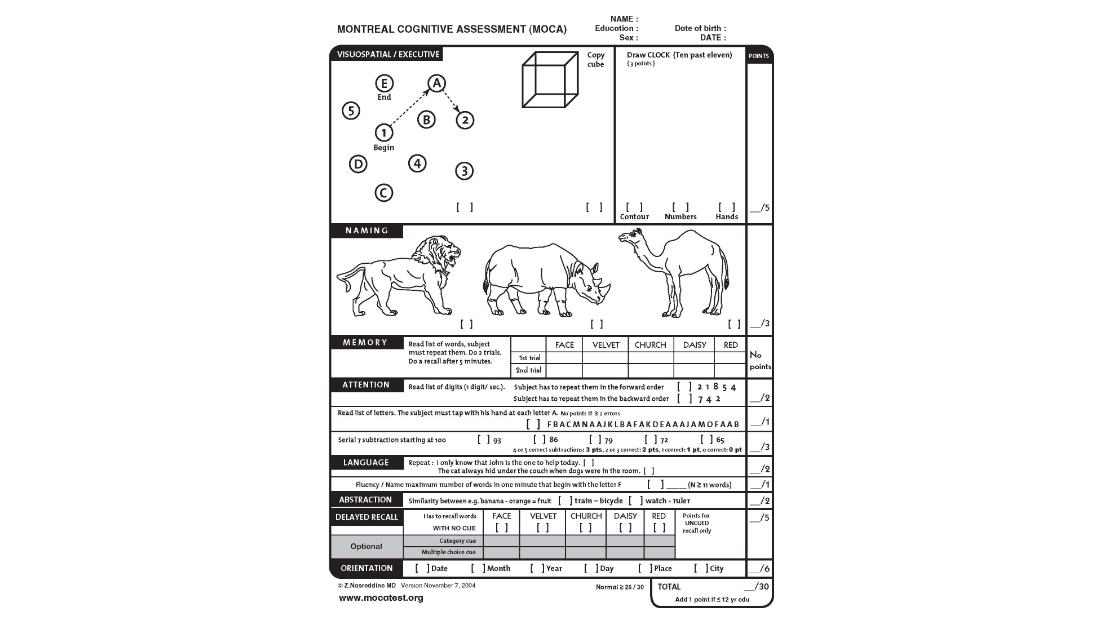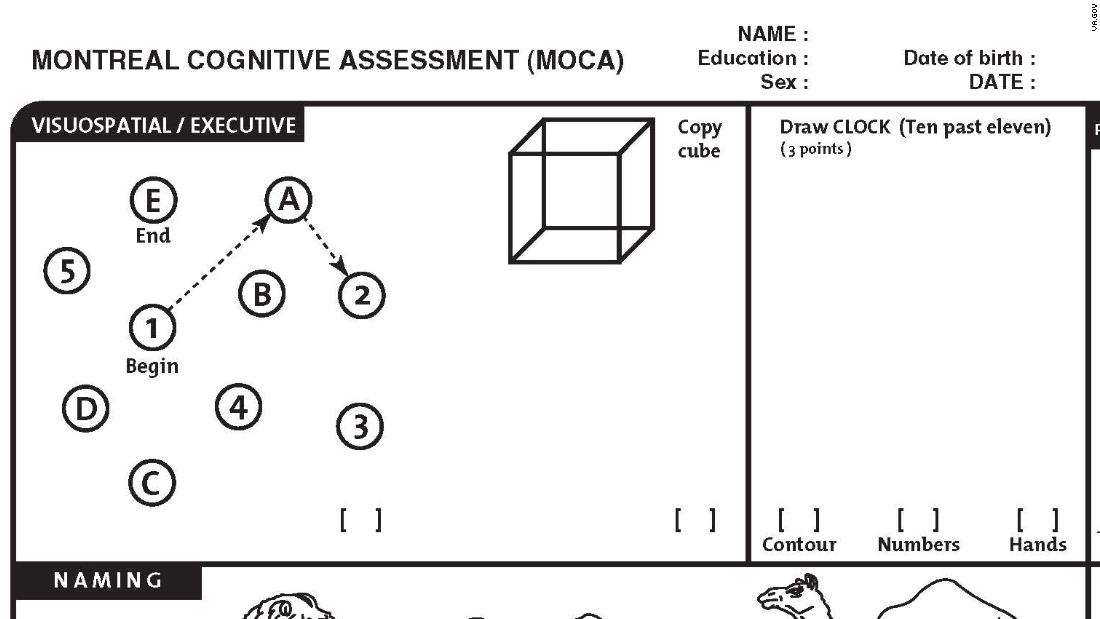Donald Trump's cognitive test has been a subject of intense public scrutiny, sparking debates about the former president's mental acuity and leadership capabilities. The Montreal Cognitive Assessment (MoCA), administered during his physical exam in 2018, became a focal point for media analysis and public curiosity. While the test results indicated a strong performance, questions persist about its implications for presidential fitness and cognitive health evaluation standards in high-pressure roles.
The significance of the "trump cognitive test" extends beyond mere medical evaluation, touching on broader discussions about transparency in leadership health assessments. As political figures increasingly face scrutiny over their mental fitness, the case of Trump's cognitive evaluation serves as a pivotal example of how public figures navigate health-related transparency. This examination not only sheds light on the specific details of Trump's assessment but also explores the broader implications for future presidential health evaluations.
Understanding the context and nuances of the cognitive test administered to Donald Trump requires delving into the specifics of the MoCA evaluation, its scoring methodology, and expert interpretations. By examining both the test's structure and the public discourse surrounding it, we gain valuable insights into the intersection of health, politics, and public perception. This article aims to provide a comprehensive analysis, drawing from credible medical sources and expert opinions to offer clarity on this often misunderstood topic.
Read also:Lorin Allred The Inspiring Journey Of A Visionary Leader
Table of Contents
- Biography of Donald Trump
- What is the Purpose of the Trump Cognitive Test?
- How Did Trump Perform in the Cognitive Test?
- Why is the Trump Cognitive Test Important?
- Examining the Trump Cognitive Test Results
- Understanding the MoCA Evaluation
- Expert Opinions on Trump's Cognitive Assessment
- Public Perception and Media Coverage
- Implications for Presidential Health Evaluations
- Can the Trump Cognitive Test Set a Precedent?
Biography of Donald Trump
Before delving into the specifics of the cognitive test, it's essential to understand the background of the individual in question. Donald J. Trump, born on June 14, 1946, in Queens, New York, is a former real estate developer, television personality, and the 45th President of the United States. Below is a summary of his personal details:
| Full Name | Donald John Trump |
|---|---|
| Date of Birth | June 14, 1946 |
| Place of Birth | Queens, New York |
| Education | Bachelor of Science in Economics from the Wharton School of the University of Pennsylvania |
| Occupation | Real estate developer, television personality, politician |
| Presidency | January 20, 2017 – January 20, 2021 |
Trump's extensive career and public life have made him one of the most scrutinized figures in modern history, with his health and cognitive abilities often subject to public discussion.
What is the Purpose of the Trump Cognitive Test?
The primary purpose of the cognitive test administered to Donald Trump was to assess his mental acuity and cognitive functioning. The MoCA, designed to evaluate mild cognitive impairment, focuses on memory, attention, language, and problem-solving abilities. Unlike comprehensive neuropsychological evaluations, the MoCA provides a snapshot of cognitive health, specifically targeting areas commonly affected by early-stage dementia or neurological conditions.
Administered during Trump's annual physical examination, the test aimed to address public concerns about the mental fitness of the then-president. While the MoCA is not a definitive diagnostic tool, its results can indicate potential areas for further investigation, ensuring that any concerns about cognitive decline are addressed promptly.
How Did Trump Perform in the Cognitive Test?
According to public reports, Donald Trump scored 30 out of 30 on the MoCA, indicating strong cognitive functioning. However, experts caution against overinterpreting this score, as the test's brevity and specific focus limit its diagnostic capabilities. The "trump cognitive test" results have been widely cited in media discussions, often oversimplifying the complexities of cognitive evaluation.
While a perfect score suggests no immediate concerns, experts emphasize the importance of longitudinal assessments to monitor cognitive changes over time. The test's administration during Trump's presidency highlights the growing emphasis on mental health evaluations for political leaders, particularly those in high-pressure roles.
Read also:Nancy Reagans Hollywood Nickname The Untold Story Behind Her Fame
Why is the Trump Cognitive Test Important?
The significance of the "trump cognitive test" lies in its role as a catalyst for broader discussions about leadership health evaluations. As political figures face increasing scrutiny over their mental fitness, the MoCA's administration to Trump set a precedent for transparency in presidential health assessments. While some critics question the necessity of such tests, proponents argue that they provide valuable insights into a leader's cognitive capabilities.
This importance extends beyond individual assessments, encouraging policymakers to consider standardized health evaluation protocols for future leaders. The "trump cognitive test" serves as a case study for evaluating the balance between transparency and privacy in leadership health matters.
Examining the Trump Cognitive Test Results
A closer examination of the test results reveals insights into the specific areas evaluated during the MoCA administration. The test's structure includes tasks assessing visuospatial skills, naming abilities, memory recall, and attention span. Trump's perfect score indicates strong performance across these domains, though experts caution against drawing definitive conclusions from a single evaluation.
Public perception of the "trump cognitive test" results often overlooks the complexities of cognitive assessment, focusing instead on the score itself. By understanding the test's methodology and limitations, we gain a more nuanced perspective on its implications for leadership evaluations.
Understanding the MoCA Evaluation
The Montreal Cognitive Assessment (MoCA) represents a widely used tool for evaluating mild cognitive impairment. Developed by neurologists, the test incorporates various tasks designed to assess different cognitive domains. While not a substitute for comprehensive neuropsychological evaluations, the MoCA provides valuable insights into potential areas of concern.
For political leaders like Trump, the MoCA serves as an initial screening tool, prompting further investigation if necessary. Its administration during Trump's presidency highlights the growing recognition of cognitive health's importance in high-pressure roles.
Expert Opinions on Trump's Cognitive Assessment
Medical professionals and cognitive health experts offer diverse perspectives on the "trump cognitive test" results. While some view the perfect score as evidence of strong cognitive functioning, others emphasize the need for longitudinal assessments to detect subtle changes over time. Expert opinions converge on the importance of regular evaluations for leaders in demanding positions.
These insights underscore the value of incorporating cognitive assessments into routine health evaluations for political figures, ensuring early detection of potential concerns.
Public Perception and Media Coverage
The "trump cognitive test" generated extensive media coverage, reflecting public interest in leadership health evaluations. News outlets and social media platforms extensively discussed the test's administration and results, often framing the narrative through political lenses. This coverage influenced public perception, shaping opinions on the necessity and implications of cognitive assessments for political leaders.
By analyzing media narratives and public reactions, we gain insights into the broader societal attitudes toward leadership health transparency. The test's administration during Trump's presidency serves as a pivotal moment in this evolving discourse.
Implications for Presidential Health Evaluations
The "trump cognitive test" raises important questions about the future of presidential health evaluations. As public expectations for transparency increase, policymakers must consider standardized protocols for assessing leadership cognitive health. These evaluations should balance the need for transparency with respect for individual privacy, ensuring that leaders receive appropriate health assessments without compromising their personal information.
By examining the implications of the "trump cognitive test," we gain valuable insights into the evolving landscape of leadership health evaluations, informing future practices and protocols.
Can the Trump Cognitive Test Set a Precedent?
The administration of the MoCA to Donald Trump could set a precedent for future presidential health evaluations. As society increasingly recognizes the importance of cognitive health in leadership roles, standardized assessment protocols may become a norm. The "trump cognitive test" serves as a case study for evaluating the balance between transparency and privacy in leadership health matters, influencing future practices and public expectations.
By examining the test's administration and its implications, we gain insights into the evolving standards for leadership health evaluations, ensuring that future leaders receive appropriate assessments to maintain public trust and confidence.
Conclusion
The "trump cognitive test" represents a pivotal moment in the discourse surrounding leadership health evaluations. By examining its administration, results, and implications, we gain valuable insights into the intersection of health, politics, and public perception. As society continues to recognize the importance of cognitive health in high-pressure roles, standardized evaluation protocols may become a norm, ensuring transparency and trust in leadership assessments.
This comprehensive analysis highlights the complexities of cognitive evaluations for political leaders, emphasizing the importance of expert insights and longitudinal assessments in understanding cognitive health. The "trump cognitive test" serves as a valuable case study for evaluating the evolving standards of leadership health evaluations, informing future practices and public expectations.


